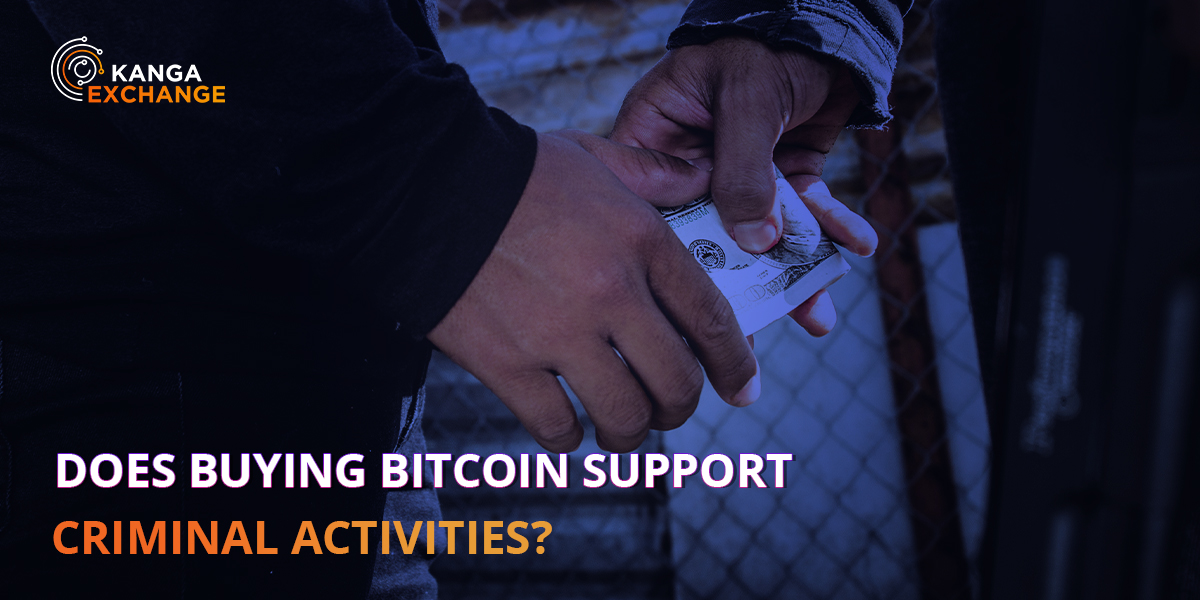Does buying bitcoin support criminal activities?

Written by
Kanga
Published on
In this article we focus on cryptocurrencies and money laundering issue. With digital assets, such as cryptocurrencies the process is similar, but with some advantages for safety side. Digital goods based on blockchain technology are traceable and accessible. Not only law forces
or regulators can follow the flow, also independent organizations or private companies use AI and algorithms to follow all large transactions.
Buying bitcoin and money laundering.
How it works?
Let’s get through money laundering technique we know from first article of this series and place it in cryptocurrency realms:
Placement: illicit cash can be transferred into crypto via OTC offices or placed onto blockchain directly with the use of bitcoin ATMs. These actions need corrupted entities at OTC offices or large number of money mules. Another case would be crypto assets acquired by theft
or a scam. Here criminals are already in possession of crypto asset.
Layering: once acquired illicit virtual assets will be sent to various wallets, through exchanges and mixers dedicated to profit from staking
or other investments. Once mixed they are redistributed to clients and cycle closes with integration.
But is it really so obvious and easy to process?
Almost every digital asset is traceable basing on major rule of blockchain: trustlessness. There are exceptions like private coins, which leave no trace behind or are programmed to delete transaction data without hurting blockchain functionality, but these are in minority. Besides private coins are in conflict with law makers and recently are being delisted from centralized exchanges.
So if everything is the same with traditional cash laundering why is it different?
In general the use of cryptocurrency as part of criminal schemes is increasing. However, the overall number and value of cryptocurrency transactions related to criminal activities still represent only a limited share of the criminal economy when compared to cash and other forms of transactions.
In 2021 $8,6 billion was laundered via cryptocurrency. Annual record on that procedure appeared in 2019 with almost $11 billion. Amount seems big, but comparing this to data from first part of the article on world’s total amount of money laundered, it’s a small fraction:
11 billion out of 715 billion gives 1,5%. Counting maximum laundered value of 1,8 trillion per year, the ratio falls to 0,93% . So less than 1%
of all illicit funds were laundered via cryptocurrency.
Why criminals are not so keen to use crypto in their money laundering activities?
Because cryptocurrencies are not anonymous. Every single transaction is logged onto the blockchain, which is a ledger of all transactions distributed to all users in the network. Most blockchains are publicly available, making transactions traceable. This gives law enforcement access to more information. While privacy coins and a number of services and techniques may hinder law enforcement investigations, it does by no means stop law enforcement from finding out who is hiding behind the crime.
Moreover the investigations in crypto is different to traditional way of investigating money laundering. Once a criminal will decide to use cryptocurrencies to legalize their assets from criminal activity, there are few advantages for investigators in crypto world. First is real time action. Exchanges and other DeFi businesses use blockchain analytic tools and AI to track suspicious actions in their organizations. In this way they can prevent or even stop ongoing process. Investigation can be launched just after first signs of suspicious activity. Comparing it to traditional banking investigations that are conducted months after the actions took place, when the money is redistributed and hard to trace.
Crypto companies also share information in much more efficient way as they’re not bounded with personal information protecting laws. This comes from nature of blockchain itself as there is no personal information behind private keys and wallets’ numbers. Without knowing
a personal data, algorithms can follow suspicious moves and patterns and put a red flag on it quickly. Last but not least is liaison with law enforcement. Cryptocurrency organizations once they detect fraud or money laundering patterns they quickly send it to authorities so law enforcement can act in real world and put charges and arrests on suspects.
Despite a common opinion that crypto assets are great solution for criminals for money laundering, the facts and statistics state otherwise. Only 1% of all laundered money used crypto as a tool. The blockchain technology itself supports safety and gives advantages for law enforcement.
Of course it is and probably will be used in financial crimes, as criminals always look for new ways to run their activities, but it is very unfair
to state that blockchain is criminal tool. Like with knife or atom technology, it can be used in good or bad way, depending on intentions.
Aleksander Sucharda
for Kanga Exchange